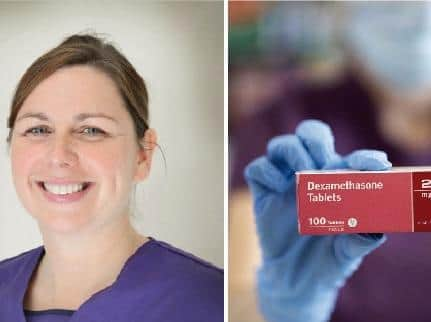How Lancashire researchers and patients helped with global Covid breakthrough - and shot down Trump's miracle drug claims
and live on Freeview channel 276
It puts Lancashire at the heart of a breakthrough that has had global significance since being announced on Tuesday – with a cheap steroid now being given to seriously ill coronavirus patients in order to save their lives.
Nichola Verstraelen, the matron who oversaw a team of around 100 researchers and frontline medics, said: “I’ve been in research for 15 years and this is one of the highlights of my career.”
Advertisement
Hide AdAdvertisement
Hide AdThe drug, dexamethasone, cuts the risk of death by a third for patients on ventilators, and a fifth for those on oxygen.


Around 70 Covid patients at Preston and Chorley took part in the study, which started in April. Not all were given the drug – some were routinely given placebos.
The results were then sent to Oxford for analysis as part of a national effort to find a treatment for the disease.
“We try not to do our own analysis of what’s happening with those patients because that will affect the bias,” Nichola, who works at the NIHR Lancashire Clinical Research facility, based at Royal Preston, said.
Advertisement
Hide AdAdvertisement
Hide Ad“We left the analysis to the researchers at Oxford. We found out the medication was taken off the trial last week and they said they had enough data – and a few days later we found out it was effective.”
Patients who need the drug, which costs around £40 for each course of Covid treatment, are already being prescribed it, just months after the trial started.
That’s partly down to the fact the anti-inflammatory medication has been safely used for decades already, having been developed in 1957.
But such speedy progress is still “unheard of”, Nichola said, adding: “Normally, with new medications, it takes years and years.”
Advertisement
Hide AdAdvertisement
Hide AdOther trials are also being carried out, including examining the role of antibodies as a “diagnostic tool”, Nichola said, while some have already ended without positive results.
A study into hydroxychloroquine, the anti-malaria drug touted by Trump, who used a press conference to claim “we ought to give it a try” before later tweeting there were “some very strong, powerful signs" of its potential as Covid treatment, was stopped around four weeks ago because there was “no evidence it was working,” Nichola added.
“Even when you get negative results, it’s good because we know now. The whole world was probably getting hydroxycholorquine ready to treat patients, but now we know it doesn’t work.”
Health Secretary Matt Hancock said around 200,000 courses of dexamethasone have been stockpiled.
Advertisement
Hide AdAdvertisement
Hide AdA course involves a six milligram dose, once a day, which can either be given by mouth or by injection.
Mr Hancock said: “It’s because we backed the science, and because we’ve taken the approach that’s guided by the science, that we’ve been able to deliver this result.”
Blackpool Victoria Hospital also took part in the trial, with the doctor in charge, Jason Cupitt, saying: “Credit must go locally to our research nurses and doctors.”
Comment Guidelines
National World encourages reader discussion on our stories. User feedback, insights and back-and-forth exchanges add a rich layer of context to reporting. Please review our Community Guidelines before commenting.